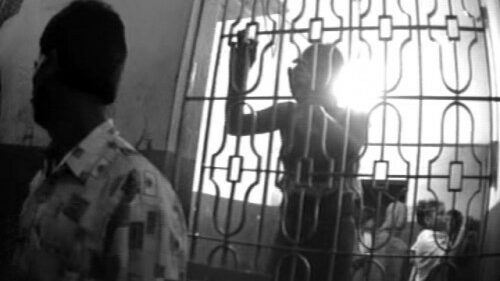Trafficker Receives Maximum Punishment After Two Years in Hiding
Sex Trafficking
Three years ago in a district courtroom outside Kolkata, Maya* stood on the wooden witness stand and boldly shared her story. She declared that the man standing trial had raped and tortured girls trapped in a brothel, threatening them with dire consequences if they refused to obey.
“If you have seen so much abuse and torture in front of your eyes, don’t you want the person who did all this to have justice?” Maya shared afterwards. “If you don’t protest against what he did, he will never be stopped.”
Maya’s story changed history when this court declared the trafficker guilty.
On April 16, 2015, the trafficker, Naru Gopal Shaw, was sentenced to 13 years of rigorous imprisonment—the maximum punishment and the longest sex trafficking sentence ever in an IJM India case.
Shaw will serve 13 years for a plethora of crimes, including managing a brothel, rape and abetting (assisting) the brothel owner Nakul Bera, who has been convicted twice in IJM cases. Most sentences run concurrently, meaning the prison time for each charge overlaps, but this judge made the unprecedented decision to stack the charges.
“This is the first time IJM Kolkata has secured a rare conviction for abetment,” says Saptarshi Biswas, IJM Kolkata legal director. “This proves that even men who are not directly involved, but are helping as accomplices, can also be punished.”
Shaw was also fined $2500, which will be divided among Maya and the three other survivors.
IJM staff met Maya six years ago in a motel located just off a major freeway.
The dingy roadside motel was a front for a brothel, one of several owned by a powerful man named Nakul Bera. Shaw was Bera’s friend and accomplice. He helped “break” the girls when they arrived.
In 2009, IJM helped state police rescue Maya, Mala and two other girls. That operation took months of planning and seven attempts—each one failing due to tip-offs that underscored the power of the men running these brothels. They seemed to reign with impunity.
It took another nine months to find and arrest Nakul Bera, the brothel owner, and another year after that to arrest his accomplice, Shaw.
The battle for justice began with the trial.
Both Bera and Shaw repeatedly applied for bail. Every time, an IJM lawyer would take half a day to drive to the courthouse to work with prosecutors to make sure the request was denied. It was critical that these dangerous men remain in custody during the trial; if not, they would likely run away and slip into hiding.
In early 2011, Shaw was granted bail. With IJM’s support, Maya bravely filed a petition to cancel his bail before the High Court. Although it was approved, Shaw fled and disappeared for two years. Nakul Bera was convicted in March 2013 and again in a second case in February 2015, but the case against Shaw stalled.
In India, a trial cannot move forward without the suspect present. IJM worked closely with police to keep searching for Shaw, and he was finally found and re-arrested in 2013.
The trial resumed, and three survivors, including Maya, came back to testify against Shaw. One survivor even made the arduous four-hour journey from her home six months pregnant to stand before the court.
However, one suspect remains on the run—Nakul Bera’s son. Police are still searching for him.
Maya, who is now the proud mother of a six-year-old daughter, is hopeful that these convictions will send a clear message to other criminals.
“This will bring terror to people who are running brothels or abusing girls,” she said. “When people hear that these men who were very powerful are behind bars, they will think twice about doing this kind of work.”
“Shaw’s convictions are proof that the justice system is taking a stand against such violent crimes,” said Biju Mathew, IJM’s Field Office Director. “Maya and the other survivors can rest assured that the justice system is protecting them. Criminals have reason to be afraid: They know they can no longer commit their crimes with impunity.”
Join IJM in taking a stand against violence by watching Gary Haugen's TED Talk.